

5 ans après les accords de Paris : quelle est la prochaine étape ? 11 déc. 2020 L’Accord de Paris, cinq ans de laisser-faire. L’Accord de Paris sur le climat fait suite aux négociations tenues lors de la COP 21 en novembre et décembre 2015.

Approuvé par l’ensemble des 195 délégations le 12 décembre 2015, il entre en vigueur le 4 novembre 2016 – trente jours après sa ratification par au moins 55 Parties représentant 55 % des émissions de gaz à effet de serre. Une aide climatique est prévue pour les pays en développement avec un plancher de 91 milliards d’euros. Mais « à tout moment après un délai de trois ans à partir de l’entrée en vigueur de l’accord pour un pays », celui-ci peut s’en retirer, sur simple notification.
Ainsi, le 1er juin 2017, Donal Trump annonce la sortie des États-Unis de l’Accord de Paris, avec comme motifs : il va « tuer 2,7 millions d'emplois » et « désavantager l'économie américaine ». Second plus gros émetteur de CO2 et premier producteur mondial de pétrole, les États-Unis sont le seul pays au monde à se désengager de ce texte. En 2019, on peut constater au sein du G20. Climat : seulement 16 pays appliquent réellement l'accord de Paris.
Trump still hasn’t decided whether to dump the Paris climate agreement or not. Born and raised in Oahu, Hawaii, Evan Weber went to the same K-through-12 school attended by future President Barack Obama.

By the time Weber got to college, he was taking his fellow Punahou School alum to task for what Weber believed was an inadequate climate action plan. Together, Weber, a college buddy, and one of their professors drafted their own climate agenda, a policy report they initially simply called “The Plan.” Avant le Déluge : documentaire intégral - National Geographic Channel et Nat Geo Wild partout. Relance autoroutière… une impasse climatique ! – Agir pour l'Environnement. Big countries are still waiting to ratify the Paris climate deal. What’s the holdup? In the wake of the U.K.’s vote to leave the European Union, environmentalists have been in a bit of a tizzy.
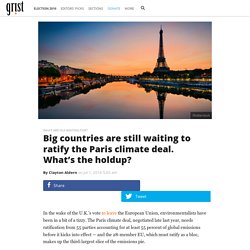
The Paris climate deal, negotiated late last year, needs ratification from 55 parties accounting for at least 55 percent of global emissions before it kicks into effect — and the 28-member EU, which must ratify as a bloc, makes up the third-largest slice of the emissions pie. But things are tumultuous in Brussels these days, raising concerns that the EU might not manage the task anytime soon. If the EU doesn’t formally join the agreement before the end of the year, further pressure will be placed on the rest of the world to ratify and bring the deal into effect.
“If you’re able to secure India, China, Japan, Canada, Mexico — all of the rest of the major economies — there are a lot of pathways that can get you there,” says Pete Ogden, a senior fellow at the Center for American Progress and former climate adviser to the White House. But what, exactly, is everyone else waiting for? France ratifies U.N. climate deal. Your move, rest of world. France on Wednesday became the first global power to formally join the U.N. climate deal, after it was negotiated in Paris late last year.
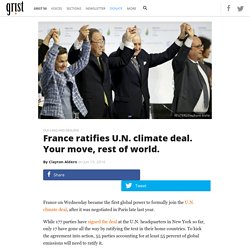
While 177 parties have signed the deal at the U.N. headquarters in New York so far, only 17 have gone all the way by ratifying the text in their home countries. To kick the agreement into action, 55 parties accounting for at least 55 percent of global emissions will need to ratify it. There’s a catch with the French ratification, too: It won’t count for anything if the rest of Europe doesn’t do the same. Cash investigation du 24-05-2016 à 20:55 - Climat : le grand bluff des multinationales en replay. A top climate negotiator isn’t stressing out over the future of the Paris agreement. Before the Paris climate agreement enters its next stage – getting signed by 155 countries at the United Nations headquarters on Friday – I caught up with the United States’ outgoing special envoy for climate change on the phone.
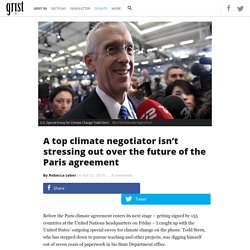
Todd Stern, who has stepped down to pursue teaching and other projects, was digging himself out of seven years of paperwork in his State Department office. COP 21 : ratifier c'est bien, changer de politique, c'est mieux. Scellé aux forceps le 12 décembre dernier au Bourget au prix de l’élimination de toute contrainte, l’Accord de Paris n’entrera en vigueur qu’en 2020, à la condition que 55 pays représentant 55 % des émissions mondiales de gaz à effet de serre le ratifient.
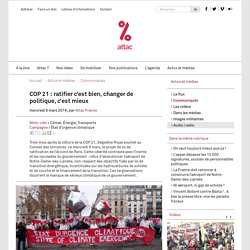
La ministre de l’Environnement affirme « s’activer » pour « qu’un maximum de pays viennent signer l’accord » le 22 avril à New-York, lors d’une séance officielle à l’ONU. « La dynamique de l’accord de Paris doit se transformer en action » a-t-elle déclaré avant sa récente tournée express en Afrique. Le gouvernement français n’en prend clairement pas le chemin : de Notre-Dame-des-Landes au torpillage du préjudice écologique en passant par l’allongement de la durée de vie des centrales nucléaires, les signaux envoyés sont ceux d’un gouvernement sans cap écologique ni volonté de sobriété énergétique.
Si Ségolène Royal s’agite pour faire ratifier l’Accord de Paris, elle vient d’illustrer à nouveau l’inconsistance du gouvernement. Pour respecter les engagements pris lors de la COP21, la France doit renoncer à construire l’aéroport de Notre Dame des Landes. Qui a déclaré : « A Paris, il y a eu bien des révolutions depuis des siècles, mais aujourd’hui c’est la plus belle et la plus pacifique des révolutions qui vient d’être accomplie : la révolution sur le changement climatique »?

Réponse : François Hollande, en clôture de la COP21, la conférence internationale sur le climat, le 12 décembre 2015. Pourquoi la Conférence de Paris a-t-elle été qualifiée de succès? La plupart des grandes organisations internationales, groupes écologistes, grands médias et l'ensemble des pays de la planète ont salué l'accord de Paris comme un accord historique, et avec raison à mon humble avis.
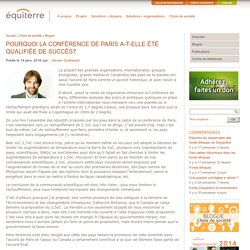
D'abord, avant la ronde de négociation entourant la Conférence de Paris, différentes analyses des plans et politiques publiques en place à l'échelle internationale nous menaient vers une planète où le réchauffement planétaire serait de l'ordre de 3,7 degrés Celsius, soit presque deux fois plus que la limite qui avait été fixée à Copenhague en 2009 de 2 degrés.
Or, une fois l'ensemble des objectifs proposés par les pays dans le cadre de la conférence de Paris, c'est maintenant vers un réchauffement de 2,7oC que l'on se dirige. C'est encore trop, mais c'est tout de même 1oC de réchauffement que Paris permettra d'éviter si, et seulement si, les pays respectent leurs engagements (et j'y reviendrai). Le monde comme il va, 10 jours après la Cop 21. COP21 : en dépit du spectacle, le verre est vide à 80% Crédit Photo : NPA JeunesLa COP21 a, comme prévu, débouché sur un accord.
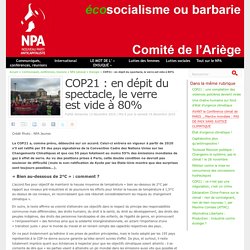
Celui-ci entrera en vigueur à partir de 2020 s’il est ratifié par 55 des pays signataires de la Convention Cadre des Nations Unies sur les Changements Climatiques et que ces 55 pays totalisent au moins 55% des émissions mondiales de gaz à effet de serre. Au vu des positions prises à Paris, cette double condition ne devrait pas soulever de difficulté (mais la non-ratification de Kyoto par les Etats-Unis montre que des surprises sont toujours possibles…). « Bien au-dessous de 2°C » : comment ? L’accord fixe pour objectif de maintenir la hausse moyenne de température « bien au-dessous de 2°C par rapport aux niveaux pré-industriels et de poursuivre les efforts pour limiter la hausse de température à 1,5°C au-dessus de ces niveaux, en reconnaissant que cela réduirait considérablement les risques du changement climatique ». « Concilier l’inconciliable » ? Alors, qu’en est-il ? BIOSPHERE-INFO, une synthèse sur le climat.
La COP21 vient de se terminer sur fond d’état d’urgence et d’impuissance politique.

Coal boss fears industry will be “hated and vilified” after Paris Agreement. This story was originally published by the Guardian and is reproduced here as part of the Climate Desk collaboration. The head of Europe’s coal lobby has said that his industry will be “hated and vilified in the same way that slave-traders were once hated and vilified” as a result of the Paris climate deal, in an extraordinary diatribe sent to his members and press outlets. Réaction d'Attac France à l'Accord de Paris. François Hollande souhaitait qu’on se souvienne de la COP 21 comme du moment déclenchant une « révolution climatique » [1]. Par bien des points, l’accord de Paris tranche en faveur des options les plus conservatrices et les moins ambitieuses qui étaient présentes dans le texte de négociation.
L’accord de Paris valide une chose positive : les 195 États de la planète sont d’accord pour maintenir un cadre international et multilatéral – bien que très affaibli – de « gouvernance du climat » : pour véritablement changer la donne, il devient urgent que les règles et principes d’organisation de l’économie mondiale et du commerce international soient soumises à l’objectif climatique. Will the financial world wake up to clean energy thanks to Paris? So: The Paris Climate Agreement is groundbreaking. And: The Paris Climate Agreement is still not enough — even if it’s a whole lot better than any earlier attempt to slow down climate change. Feel free to oscillate between hope and cynicism (I always do). Renewables poised to surge after Paris Agreement.
Historically, the transition from one energy system to another, as from wood to coal or coal to oil, has proven an enormously complicated process, requiring decades to complete. In similar fashion, it will undoubtedly be many years before renewable forms of energy — wind, solar, tidal, geothermal, and others still in development — replace fossil fuels as the world’s leading energy providers. Nonetheless, 2015 can be viewed as the year in which the epochal transition from one set of fuels to another took off, with renewables making such significant strides that, for the first time in centuries, the beginning of the end of the fossil fuel era has come into sight.
This shift will take place no matter how well or poorly the deal just achieved at the U.N. climate summit in Paris is carried out. Fossil fuels will not, of course, disappear during this period. Breakthrough initiatives While vast in their ambitions, these two schemes are not without their critics. U.S. military no longer automatically exempt from emissions targets under Paris deal.
This story was originally published by the Guardian and is reproduced here as part of the Climate Desk collaboration. The U.S. military and armed forces of countries around the world will no longer be automatically exempted from emissions-cutting obligations under the U.N. Paris climate deal, the Guardian has learned. Although the U.S. never ratified the Kyoto Protocol, it won an opt-out from having to fully report or act on its armed forces’ greenhouse gas emissions, which was then double-locked by a House national defense authorization bill in 1999.
Under the Paris agreement, countries would not be obliged to cut their military emissions but, equally, there would be no automatic exemption for them either. U.S. officials privately say that the deal adopted on Saturday has no provisions covering military compliance one way or another, leaving decisions up to nation states as to which national sectors should make emissions cuts before 2030. The good news about farming and the Paris climate talks. There’s nary a mention of farming in the new Paris climate change agreement, which may seem like a bit of an oversight to food policy nerds (I know of what I speak). Climat: l’accord de Paris, victoire possible des communs. L’accord de Paris sur le climat pourra-t-il être plus grand que lui-même ? Voulu par la convention de l’ONU sur le climat pour établir un cadre international d’action contre le dérèglement climatique, le document adopté samedi 12 décembre par 195 États n’y changera pas grand-chose à lui seul : il se réclame de grands principes mais ne se dote pas d’outils opérationnels, reconnaît des obligations formelles mais sans grand contenu (voir ici).
Il n’oblige pas les pays à suffisamment réduire leurs émissions du gaz à effet de serre pour garantir que la température moyenne ne s’élèvera pas à plus de 2 °. Paris talks may set a lofty (but meaningless) climate change goal. This story was originally published by The New Republic and is reproduced here as part of the Climate Desk collaboration.
Compared to the conferences that came before it, Paris is going smoothly. So smoothly, relatively speaking, that there is still some sense of positivity amid the last-minute scrambling. As if to emphasize just how optimistic world leaders are feeling, negotiators released a draft agreement on Thursday that actually puts forward a more ambitious goal for global warming than many had expected going into the conference. Green groups are deeply divided on whether the Paris Agreement is a win or loss. A global climate agreement has been struck! The tide has turned! So environmentalists are happy, right? Well, that depends on which ones you ask. There is a surprisingly large range of opinion among progressives, both advocacy groups and elected officials.
COP21. "On continuera à se battre" Activists on the street have the last word in Paris. PARIS, France — While U.N. negotiations dragged on at the official conference site in the suburb of Le Bourget, thousands of activists came out in force in downtown Paris on Saturday afternoon. Their message: The deal being finalized wasn’t even close to strong enough. Climate activists have faced big obstacles as they’ve tried to stage rallies and marches in Paris over the past two weeks.
The terrorist attacks in the city last month spurred the French government to impose a state of emergency and ban public demonstrations. Originally, environmental groups had planned to hold big events, including a huge march, on the weekend before COP21, to put pressure on leaders to come up with a strong deal. But those plans had to be cancelled and replaced by more quiet, stationary events: a human chain and a shoe display that were held on Sunday, Nov. 29. Others were moved indoors.
Check out these 9 climate art projects that are wowing people in Paris. With the world’s attention focused on Paris as leaders negotiate a plan to deal with climate change, artists and activists have turned the city into a canvas for some fascinating art projects. The changing state of our planet can seem intangible, but these artists’ efforts seek to make it feel real. 1. “Ice Watch,” an installation by Olafur Eliasson and Minik Rosing, features 12 huge, melting blocks of ice (harvested from icebergs in Greenland) arranged in the formation of a clock.
How world leaders came to agree on a landmark climate deal. This story was originally published by Mother Jones and is reproduced here as part of the Climate Desk collaboration. PARIS, France — There was relief and celebration in Paris Saturday evening, as officials from more than 190 countries swept aside monumental differences and agreed to an unprecedented global deal to tackle climate change. The historic accord, known as the Paris Agreement, includes emissions-slashing commitments from individual countries and promises to help poorer nations adapt to the damaging effects of a warming world. Negotiators also agreed on measures to revise, strengthen, and scrutinize countries’ contributions going forward. World leaders adopt 1.5 C goal — and we’re damn well going to hold them to it. Obama calls Paris climate agreement “a turning point for the world” L’avenir en demi-teinte. Fumée blanche au Bourget. Huffingtonpost.
La COP21 vécue de l’intérieur. At the Paris climate talks, the rich and powerful work to stay rich. COP21: Are We Setting the Wrong Tone? Climat : le 12 décembre, les citoyens écrivent la suite du mouvement. The Paris climate agreement won’t call for keeping fossil fuels in the ground. Got 90 seconds? Video explains the hopeful news out of the Paris climate talks. L'irrésistible ascension des énergies renouvelables - Page 2. COP21 : « Les engagements actuels nous conduisent tout droit à un réchauffement climatique d’au moins +3°C. Environmental justice scores a win in California carbon policy. Choisir entre le capitalisme et le climat. NAOMI KLEIN, CHANGER OU SUBIR ? Here’s why the words “loss and damage” are causing such a fuss at the Paris climate talks. Crazy Vatican light show illuminates the pope’s climate message. That moment when climate change becomes deep, urgent, and personal.
Is Saudi Arabia trying to sabotage the Paris climate talks? Gazette de la #COP21 : le dessin du jour. L’Inde, acteur-clé des négociations sur le climat. 5 reasons to actually be optimistic about the Paris Climate Conference. La justice climatique en marche. COP 21 : 1.000 maires du monde promettent le « tout renouvelable » d’ici à 2050, Actualités. Gazette de la #COP21 : le dessin du jour. Le prix du climat. Gazette de la #COP21 : le dessin du jour. Prix Pinocchio : et les pires ennemis du climat sont... EDF, Chevron et BNP Paribas. Climat. La société civile tient sommet. Activists prepare for failure at the Paris climate summit and offer their own plan. Spécial Investigation - Ecolos : Ennemis D'Etat - Émission du 30 Novembre 2015. India and France launch a solar alliance — and a book of environmental quotes. Obama: At least some of the Paris climate deal must be legally binding. How to read the jargon at the Paris climate change talks.
Gazette de la #COP21 : le dessin du jour. #Jourdeclimat : immersion dans un monde affecté par le changement climatique. Total: cessez de faire obstruction au négociations de la Cop 21. ACDN - Action des Citoyens pour le Désarmement Nucléaire. Climate Reality. COP21 : un accord est-il possible ? COP21 : coup d’envoi d’une conférence historique à Paris. Ma COP21. Etat d'urgence... climatique The Paris climate summit is a real test of humanity. La Gazette de la COP. What will happen at the Paris climate talks? We’ve got some unconventional ideas. Here’s what you need to know about the massive climate summit kicking off in Paris.
COP21 : la société civile à l’affût. Comprendre le fonctionnement de la COP21 en patates. Environmental Action Stop The Senate Climate Saboteurs. COP21 : ce n’est pas une négociation, c’est un crime.
Déclaration Chine-France sur le climat : rien de contraignant, rien de bien nouveau ! Quels enseignements tirer de l'étude de l'ONU en amont de la COP21 ? Famous folks call for noisy climate activism ahead of Paris talks. A l’occasion du sommet sur le climat COP21, ARTE lance « Opération Climat », une campagne européenne pour un documentaire participatif. Obama is paving the way for success in Paris. Hervé Kempf explique en video les enjeux de la COP 21. Ce week-end verra fleurir les initiatives pour le climat. Changement climatique : la proposition dont aucun Etat ne veut. Climat : les « quatre piliers » de l’accord de Paris.
Conférence de Paris sur le climat. Tell Shell to take real action against climate change and not go to COP Paris!